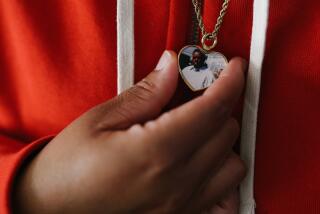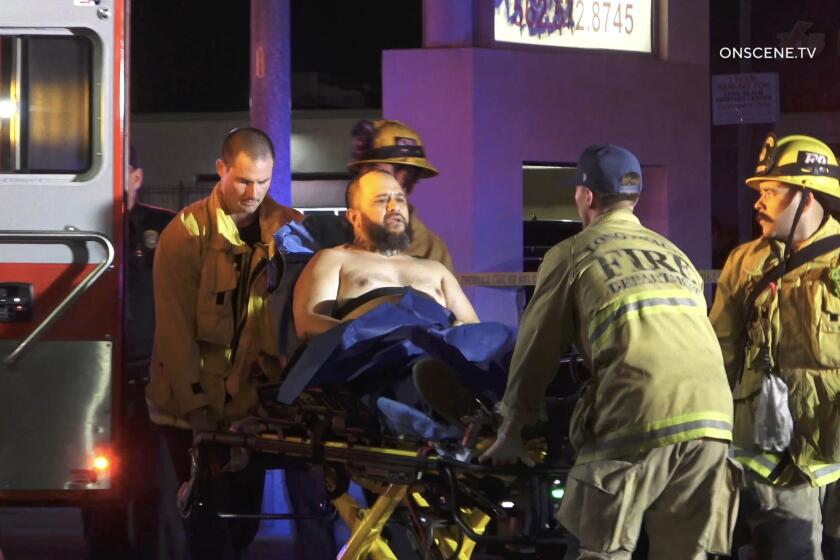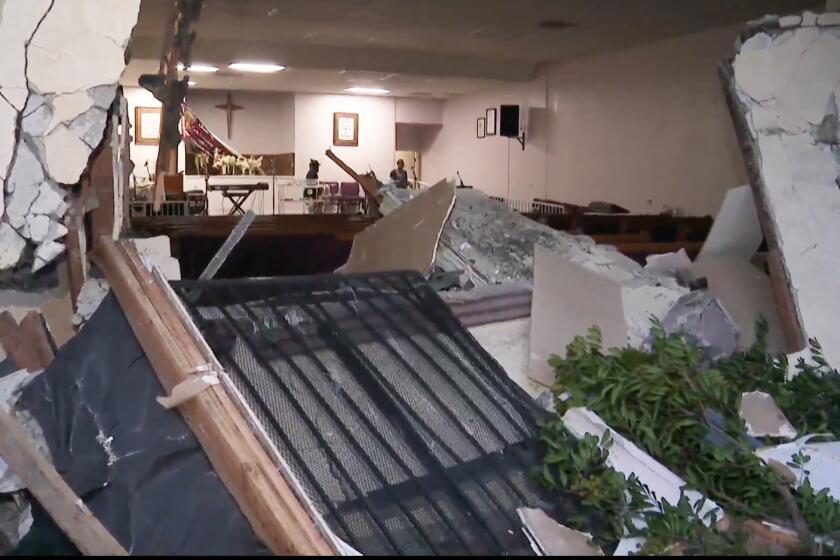After an Agonizing Wait, Families Learn the Worst
Eleanora Schlegel was not well, her son knew. At 77, she suffered from multiple sclerosis, and other ailments. And pneumonia had sent her to Glendale Adventist Medical Center on Dec. 30, 1996. But she also was improving steadily at the hospital and the next day--New Year’s Eve--she spoke to him about going home. The problem was that she lived in Pasadena.
“You know how that’s a crazy place on New Year’s,” Larry Schlegel said. “So we decided it would be OK if she stayed in the hospital a couple of days more.”
It may have been a fatal mistake.
Though she had been alert and able to feed herself, his mother was found dead the evening of Jan. 2. “Respiratory failure,” he was told at the time.
On Tuesday, Schlegel was told by Glendale police that his mother is now considered a murder victim. Lab tests found the paralyzing drug Pavulon in her body. During that final evening at the hospital, police told him, respiratory therapist Efren Saldivar had killed her.
“I’ve been aware of this possibility for a while,” said the devastated son. “I think I’ve put up a lot of walls.”
On Tuesday morning, a similar call from the Glendale Police Department woke Cecilia Alfaro: Saldivar was in custody, she was told, under arrest after a 34-month investigation.
Later in the day, a detective came out to her daughter’s home in Glendale to give the two women more specific news. Alfaro’s 82-year-old husband, Jose, also was one of the six former patients now being considered victims.
“Who is he [Saldivar} to kill?” asked Cecilia Alfaro. “That was my husband. We were married in 1941. I was only 26. And this guy killed and he had no right to kill.
“When they kill a member of your family. . . .”
Saldivar reportedly told police he had killed for five years--a time when hundreds of patients died on his shifts. Eleanora Schlegel and Jose Alfaro were among the sampling of 20 former patients whose bodies authorities exhumed to test for the potentially fatal muscle-relaxing drugs he told police he had used.
On Tuesday, all 20 families got the same two-part notification: the calls first, to report the arrest before it was on the news; then the scheduling of face-to-face meetings to discuss the specific findings in their cases.
Six were told that their loved ones were considered murder victims. The 14 others were being notified that laboratory tests had found no suspicious drugs in their loved ones’ bodies--at least not enough to sustain a murder case.
For all of them--those with “hits” and those with no such finding--the word came after long, agonizing waits for news that, at first, most had not suspected.
When Jose Alfaro Sr. died Jan. 4, 1997, his family had no reason to believe that it was anything other than a natural death.
Alfaro had lived a long life: Raised in the Philippines, like his wife, he was a World War II veteran and a survivor of the Bataan Death March. He worked as a bus driver before coming to the United States in 1992, where several of the children had already settled. One reason was to join them. Another was the citizenship offer from the U.S. government to Filipino soldiers who had helped the Allied cause.
Two weeks after he arrived, Alfaro was sworn in as a citizen at a ceremony at Parker Center.
He was already suffering from emphysema. By the time he was admitted to the Glendale hospital Jan. 2, 1997, he was suffering from severe pneumonia, and not for the first time. He had chronic pulmonary and arterial diseases as well. He was living in a convalescent facility and had been hospitalized many times. The most recent stay had been less than a month earlier. The family had asked that no heroic measures be taken to keep him alive: His chart would have included a “DNR” order--Do Not Resuscitate.
So there was no cause for suspicion when Cecilia Alfaro and the children were notified that Jose Alfaro had died shortly after 9 p.m. Jan. 4., of “cardiorespiratory failure.”
Family members also had little reason to give it much thought when they heard, 14 months later, that a respiratory therapist was under investigation for possibly killing patients. Although a police affidavit suggested that Saldivar had targeted elderly “DNR” patients, they could not believe that Jose had been among them.
Seventeen more months passed. This time, the family was notified by police--it was Aug. 1, 1999--that a court order had been obtained to exhume Jose Alfaro’s body from San Fernando Mission Cemetery.
Then, nothing. As month after month passed, some families doubted whether anything would come of the nation’s latest hospital poisoning scandal. Some simply didn’t want to hear about it--they wanted their loved ones to be “left in peace.”
Others filed lawsuits. Two sisters settled without knowing whether their mother had died naturally or would be classified as a homicide victim.
The Alfaros never really believed that Jose had been killed, but filed suit anyway to protect their rights, just in case.
“When he died, they just accepted his death,” said the family’s attorney, Matthew B.F. Biren. “After Saldivar’s confession, they didn’t have any reason to connect it up. It wasn’t until police said they wanted to exhume his body that it became very personal to them.”
It became even more personal Tuesday--with the visit from the detective who had investigated Alfaro’s case. He told Cecilia Alfaro and her daughter Zenaida how the potent muscle relaxer had been found in Jose Alfaro’s tissue. It was not a drug that medical records showed he had been administered. If he had it in his system, police surmised, he had been given it without authorization.
“That was very upsetting,” Biren said a short time after the meeting. “They were very comfortable with their husband and father sick and dying. Then they were told there was a possibility of inappropriate contact. Now there’s been preliminary confirmation. That’s very upsetting.”
Authorities have not released the names of the patients they are classifying as homicide victims or of the other patients whose bodies were exhumed. Some of their identities are known from lawsuits or from the locations of the very visible early morning exhumations conducted during 1999.
At least six civil cases have been consolidated in Burbank Superior Court. Three were filed by families who say they were alerted that police had requested the exhumation of deceased relatives, indicating that death was considered suspicious.
One case, filed by the two daughters of Salbi Asatryan--who died at Glendale Adventist on Dec. 30, 1996--has “been resolved” since it was filed last March, according to an attorney for the women.
Several other families said they had been notified Tuesday of the arrest, but were not meeting with detectives until today to hear whether police believe their loved ones were killed.
The remaining civil proceedings have been on hold because police refused to release any of their evidence while the investigation was under way. An attorney for Saldivar had argued that the secrecy and prolonged investigation trapped him in “a living hell,” but a judge last year rejected a motion to open the records, leaving many family members in limbo as well.
Pauline Raven is one. Police did not tell her Tuesday that her husband’s case was one of the “hits,” but she still believes he was killed by Saldivar in August 1997, two days after he was admitted to Glendale Adventist. Her husband’s body was one of those exhumed.
“He killed him,” the 85-year-old Montrose woman said. “No one has told me, but I know in my heart.”
Police notified Raven’s niece, Nancy Clark of Arrowhead, early Tuesday, but only that Saldivar had been arrested.
Police had dutifully called them every couple of months throughout the last two years, Clark said, to report that the investigation was continuing, but they kept any lab findings secret. “We were never able to find out the results,” she said. “We weren’t able to get it out of [them.]”
After so much time, “I was kind of surprised to hear they had enough evidence to make an arrest,” said her husband, Robert Clark.
That sort of uncertainty “has been very hard” for the families, said Biren, the lawyer for the Alfaros.
Twice recently, police had called and given a date when they “said they wanted to meet,”--suggesting that might be when they planned to make an arrest, he said. Both times, the meetings were canceled.
Not Tuesday.
“This would seem to be a breakthrough,” Biren said. “If this guy in fact killed their loved one, they’re very grateful to the police for having stayed through it all this time. And apparently they are going to bring this guy to justice.”
*
Times staff writer Jean Guccione and researcher Maloy Moore contributed to this story.
More to Read
Start your day right
Sign up for Essential California for news, features and recommendations from the L.A. Times and beyond in your inbox six days a week.
You may occasionally receive promotional content from the Los Angeles Times.






